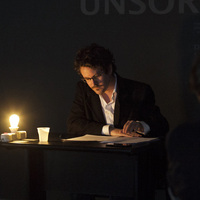Works in Progress by Laurel Silber-Sweeney

Much of philosophy has sought to understand the ways we experience the world, assess our percepti... more Much of philosophy has sought to understand the ways we experience the world, assess our perceptions, and reflect, develop, and communicate ideas. Phenomenologists such as Edmund Husserl have focused on the experiential aspects of consciousness — what it is like to be a conscious being in the world — whereas philosophers of language have attempted to define and safeguard language, syntax, logical form, etc. Ludwig Wittgenstein famously argued there is no such thing as a ‘private’ language, because communication necessarily involves another person. At best, the babblings frequently referred to as ‘baby talk’ are usually reduced to a proto-language or an early developmental stage of common linguistic forms to come. Yet there is a persisting sense in which all expression is private, insofar as it attempts to articulate first-person perspective, thoughts, emotions, experience, ideas, etc. This paper argues that in the process of trying to find what we might call their ‘public voice’ infants and toddlers faithfully reside within a pure phenomenology of being. That is, they are free of the self-imposed constraints, self-consciousness, and adherence to rules imposed by most language analysis. Our reactions to early communication are perhaps too one-dimensional, as we correct, measure, and even judge the reinforcement of baby babble, for fear of hindering language development. Rather, by validating his or her experience there is an opportunity to contribute positively to a child’s emerging sense of self. Children are in a Husserlean sense better phenomenologists than most adults are. Even — or perhaps especially — if they are speaking to an audience of one.












Uploads
Works in Progress by Laurel Silber-Sweeney